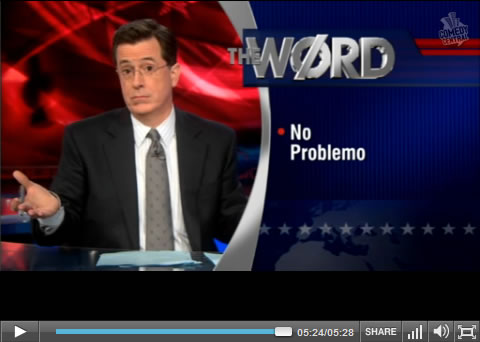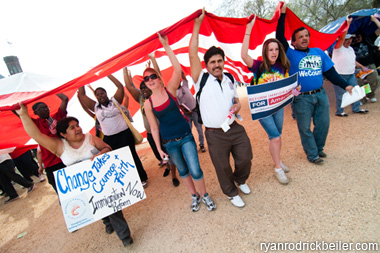
Ryan Rodrick Beiler was the Sojourners web editor from 1999 to 2010. He currently works as a freelance photojournalist based in Oslo, Norway.
Posts By This Author
Undeterred by the Facts
ON JUNE 15, 2016, Mohammed el-Halabi, manager of World Vision’s Gaza programs, was arrested by Israeli authorities, accused of funneling millions of donor dollars to Hamas, the Islamist political party that rules inside Gaza.
The case made international headlines—and had a dangerous chilling effect on Christian aid organizations working in the Middle East.
Well before el-Halabi had the opportunity to be tried—let alone convicted—of any crime, the Israeli foreign ministry prepared talking points, background materials, infographics, and videos, ordering the country’s diplomats to hype el-Halabi’s alleged confession to media and senior government officials around the world.
“Contacts, journalists, and relevant opinion makers should be briefed,” ordered senior foreign ministry officials, with particular focus on targeting “liberal and religious groups,” reported an Israeli newspaper.
But cracks in the Israeli government’s case appeared almost immediately. The most gaping: “World Vision’s cumulative operating budget in Gaza for the past 10 years was approximately $22.5 million, which makes the alleged amount of up to $50 million being diverted hard to reconcile,” said Kevin Jenkins, president and CEO of World Vision International.
According to World Vision, its programs in Gaza are subject to internal and independent audits and external evaluations to ensure that funds benefit those intended, precisely the nearly half of Gaza’s population living in poverty under a crippling blockade enforced by Israel. El-Halabi was accused of embezzling $50 million, yet World Vision’s accountability process caps signing authority at $15,000.
Undeterred by the facts, an Israeli foreign ministry spokesperson told Australian media: “It’s like when you catch a serial killer; the question of whether he killed 50 people or 25 people is not really relevant, is it?”
Pro-Israeli, Pro-Palestinian, Pro-Jesus
STUN GRENADES AND tear gas bombs exploded in the street outside of Bethlehem Bible College, forcing Rev. Alex Awad to end his class early. Down the block, youth threw stones at the Israeli separation wall that cuts deep into Bethlehem. Frequent clashes had erupted in the months since the Israeli offensive known as Operation Protective Edge killed more than 2,200 Palestinians in Gaza, most of them civilians. During that operation, 66 Israeli soldiers and seven civilians were killed by Gaza militants. In the months that followed, Jerusalem became the focal point of further violence.
“Many people ask, what are signs of hope?” says Awad. While the facts on the ground get worse, he names one encouraging trend: “Many evangelicals are moving from the Israeli side into what I think is the peace and justice side.”
Here are seven signs that he’s right:
1. Evangelicals are listening to Palestinian Christian voices. Jerusalem-born with a degree from a U.S. Bible college, Awad is uniquely suited to speak to evangelicals—including some unlikely guests. John Hagee, leader of Christians United for Israel, the U.S.’s largest Christian Zionist organization, arranged for five tour groups to visit Bethlehem Bible College. The first group arrived last August.
Gaza: The Persistent Paradox
IN "SILENCE FOR GAZA,” Palestinian poet Mahmoud Darwish captures the contradictions of the coastal enclave, describing it alternately as “ugly, impoverished, miserable,” and “the most beautiful, the purest and richest among us.” Darwish’s antonyms evoke Gaza’s crushing conditions and resilient residents, exemplars of sumud, an Arabic word roughly translated as “steadfast perseverance”—a fundamental form of Palestinian resistance. Darwish’s poem also states that Gaza “did not believe that it was material for media. It did not prepare for cameras and did not put smiling paste on its face.” And yet every person, every story, every image of Gaza illustrates this persistent paradox of a land at once ugly and beautiful.
“I DON’T KNOW why they targeted us. No rockets were fired from our neighborhood,” says citrus farmer Yusuf Jilal Arafat, whose 5-year-old daughter Runan was killed when Israeli warplanes bombed their home. Arafat’s wife, four months pregnant, and their 8-year-old son were found alive in the rubble. His surviving children now suffer from frequent panic attacks at night. Many of Arafat’s trees were destroyed by the bombs, and the ground is covered with oranges now in various stages of decay. Rumors of contamination by Israeli weapons may hurt the sales of his crop, but he will still harvest. The family is living with Arafat’s father-in-law until they can rebuild.
Rebuilding under Israeli import restrictions is no simple task, so salvaging existing materials remains a vital practice—albeit risky, according to structural engineers. But ingenuity-by-necessity is constantly on display in Gaza, whether it’s recovering crushed stone from beneath ruined highways, straightening steel rebar from bombed-out buildings, or pulverizing concrete for reuse in new (but weaker) blocks.
Toothbrushes, Towels, and Tackling Root Causes in Gaza
We met 10-year-old Noor Al-Abid in November during our first visit to Gaza.
Nakba Day Protests: Palestine's Arab Spring?
The scenes were stunning: Hundreds of demonstrators pouring across the fence between Syria and the Israeli occupied Golan Heights.
Nonviolent Activists in Palestine Face Harassment, Prison, and Violence
Last Friday, at a protest against the Israeli separation barrier in the West Bank town of Bil'in, Palestinian nonviolent activist Jawaher Abu Rahmah was killed by http://www.google.com/url?q=http%3A%2F%2Fmondoweiss.net%2F2011%2F01%2Fde...
Planning for Peace
Even before last fall's reboot of the peace process, Israeli and Palestinian headlines recycled variations on the theme, "What will happen when the talks fail?" Official spokespersons dutifully countered with optimistic clichés. But as the process drags along, on-the-ground skepticism remains.
West Bank Christian Daher Nasser expresses a widespread grassroots opinion: Governments don’t make peace, people do. Though surrounding Israeli settlements threaten to confiscate his family's land, he has invited Orthodox Jews from those same settlements for tea and sponsored soccer games between Palestinian and Israeli children. A stone at the farm’s entrance bears the painted slogan, "We refuse to be enemies," even though Israelis have bulldozed hundreds of his olive trees. His response? Plant hundreds more.
But can isolated acts of nonviolence create lasting peace? After an East Jerusalem screening of the documentary film Budrus, one of the producers, Rula Salameh, acknowledged that localized successes of Palestinian nonviolence have yet to coalesce into a comprehensive, disciplined movement. Though demonstrations have been successful at altering the path of the Israeli "separation barrier," sometimes organizers cannot prevent youths from throwing stones. Salameh and others confirm that many older Palestinians who've "paid the price" for participating in past violence admit that such methods harmed all sides, and that nonviolence is a better way.
A Prophetic Milestone Toward Peace
Palestinian Christians call for a nonviolent movement to end the occupation.
Video: Colbert Interviews Elizabeth Warren on Financial Reform
Stephen Colbert does the second best interview in recent memory with economist, passionate advocate for consumer protection, and veteran Sunday school teacher Elizabeth Warren. Second best, that is, to Sojourners' interview with her for our April magazine cover story.
Images from White House Immigration Rally and Civil Disobedience
Murray Hill for Congress!
If I were ExxonMobil or Halliburton, I’d be watching a certain congressional race with great interest. According to the Supreme Court ruling early this year in Citizens United vs. Federal Election Commission, corporations have the same rights as human beings in regard to campaign financing. So now a Maryland PR firm is breaking more new ground by making a bid to be the first corporation to run for U.S. Congress: Murray Hill Inc. has announced it will try to compete in this fall’s Republican primary for Maryland’s 8th Congressional District.
Although the firm often works for progressive causes such as labor unions, conservatives may just have to vote for it for the sake of precedent. After all, if, as many conservatives claim, private business is better than government at pretty much everything, why not elect a corporation to be in government?
Murray Hill’s promise to “eliminate the middleman” offers immediate gains in electoral efficiency. Instead of dumping piles of money into the campaign coffers of a fickle human who may only represent some of their interests, now a corporation can buy democracy direct at huge discounts. And they pass the savings on to you! (You’re a stockholder, right?)
No longer will corporations need to bankroll overpaid lobbyists to draft legislation that underpaid congressional staffers—or, gasp, grassroots activists—might monkey with. When corporations take office, lobbyists are the staffers—instead of having to wait a few years to change jobs like they do now.
Colbert's Analysis of Arizona's Immigration Enforcement Bill: No Problemo
An Emerging Introspection Round-up
On Faith on Glenn Beck, and a Video PSA for Social Justice Christians
Last week, The Washington Post's On Faith site devoted their weekly Q&A to the debate over social justice which they titled, "Wallis vs.
This Palestinian Life: Stories of Nonviolent Resistance
Last weekend I was at a family reunion where I had been invited to show pictures from my sabbatical in the Middle East last spring.
Presidents' Plans and Precedents for Peace in the Middle East
Several sources have recommended this commentary by M.J. Rosenberg at Media Matters as a helpful analysis of the new "Obama Peace Plan" for the Middle East.






